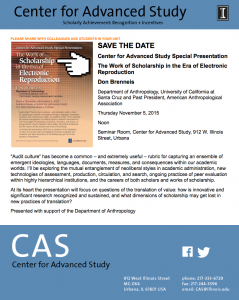“Representation of Samples of Density Functions and Regression for Random Objects”
Dr. Alex Petersen, University of CA at Davis
Date: Tuesday, February 02, 2016
Time: 3:30 PM – 4:30 PM
Location: Engineering Hall Room 106B1
Sponsor: Department of Statistics
Abstract:
In the first part of this talk, we will discuss challenges associated with the analysis of samples of one-dimensional density functions. Due to their inherent constraints, densities do not live in a vector space and therefore commonly used Hilbert space based methods of functional data analysis are not appropriate. To address this problem, we introduce a transformation approach, mapping probability densities to a Hilbert space of functions through a continuous and invertible map. Basic methods of functional data analysis, such as the construction of functional modes of variation, functional regression or classification, are then implemented by using representations of the densities in this linear space. Transformations of interest include log quantile density and log hazard transformations, among others. Rates of convergence are derived, taking into account the necessary preprocessing step of density estimation. The proposed methods are illustrated through applications in brain imaging.
The second part of the talk will address the more general problem of analyzing complex data that are non-Euclidean and specifically do not lie in a vector space. To address the need for statistical methods for such data, we introduce the concept of Fr\’echet regression. This is a general approach to regression when responses are complex random objects in a metric space and predictors are in $\mathcal{R}^p$. We develop generalized versions of both global least squares regression and local weighted least squares smoothing. We derive asymptotic rates of convergence for the corresponding sample based fitted regressions to the population targets under suitable regularity conditions by applying empirical process methods. Illustrative examples include responses that consist of probability distributions and correlation matrices, and we demonstrate the proposed Fr\’echet regression for demographic and brain imaging data.
http://illinois.edu/calendar/detail/1439?eventId=33075438&calMin=201602&cal=20160201&skinId=13335



